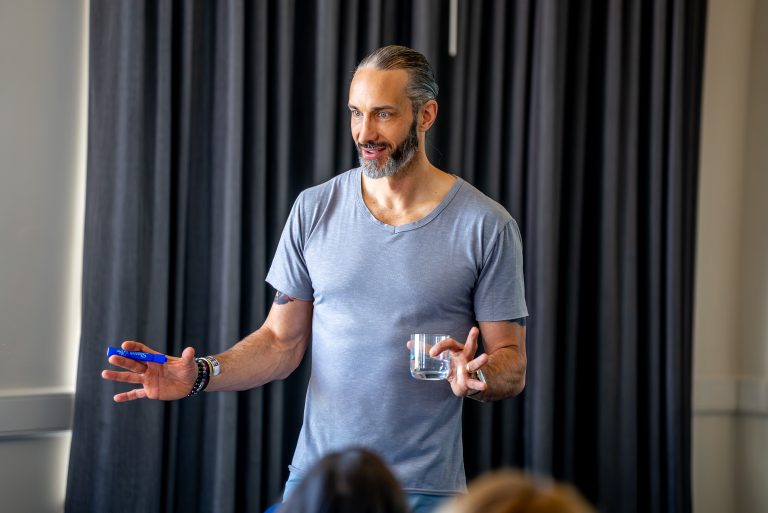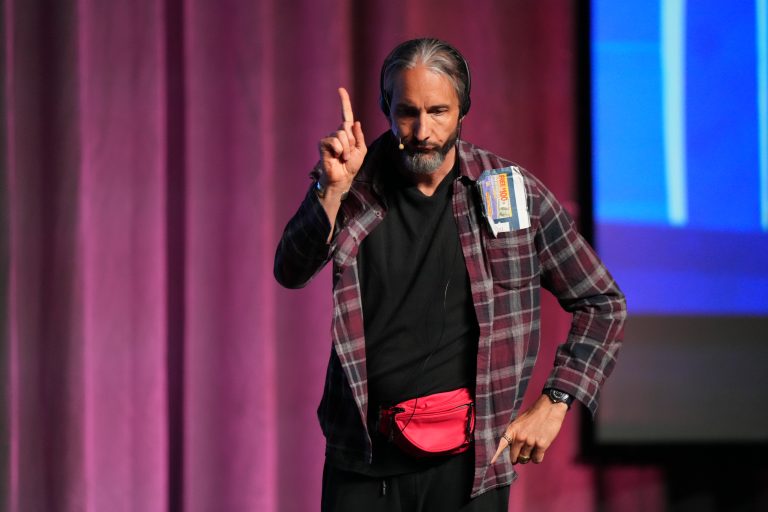I hate to admit it, but I’ve lost a lot money.
In business. Real estate. Investments.
I’d love to be enlightened enough to say these losses haven’t been a big deal. But they have been a big deal and they have hurt.
I’d also like to tell you that I learned the lessons fully and quickly, and moved forward powerfully, with an abundant perspective. Sometimes I have, other times the sting has lasted longer.
I’d even love to tell you I was ready to take on the next challenge and opportunity, without ever making the same type of mistake again.
But I’m human. I’m trusting, sometimes naïve. Excitable and passionate. I’m an optimist.
With hope and optimism, there have been times when I have ignored the signs and held on too long.
It is easier to live what I teach when the stakes are low and when relationships aren’t involved. It is much harder to live the principles that I teach when emotions are high and people are involved.
My first investment was in 1997. I started by allocating $70 per month into subaccounts (a.k.a. mutual funds) inside of an insurance policy. It was underfunded, and returns were overpromised. It only cost me $210 before I realized it wasn’t going to work.
This was my first step in learning how to assess an investment and create discernment to distinguish between sales and analysis.
That first mistake came with some pain. Even though it was a relatively small amount of money, it was a decent percentage of my net worth as an eighteen-year-old.
But with such little experience, I still had a lot more to learn.
From 1997-2008 things went well. Maybe a little too well. Plenty of growth, at least with my net worth.
After a decade of wins, gains, timing, and luck, I felt invincible.
It can be hard to learn lessons when things are going amazingly, we are flush with cash, and everything is working well.
When everything is growing or feels in flow, it can be hard to assess risks that may be looming. Items can go unnoticed due to bull markets and growth economies. It was the good times that gave me a false sense of confidence and where I confused luck and skill.
Yet, I feel there is always growth. In bull or bear markets. In good and bad economies.
Your net worth may grow or you may grow. There may be periods with cash flow growth or equity and other times with growth personally through expensive tuition and lessons where lost money helps to create attention and a new set of questions…if you are willing to look.
There was an explosion of growth in 2008. Until it all started to unravel…
My net worth evaporated and went from $8 million to almost nothing in a matter of months. Yet I learned more in two years than in the previous twenty.
I remember the moment it started to unravel. I was about to board a flight when my phone rang.
The caller was somber, so quiet I could barely hear the man tasked with delivering disappointing to devastating news to a group of people. He informed me of the failure of a real estate investment.
How could this be? I couldn’t lose. Not me. I had collateral. Everything checked out with people I trusted a few years earlier and the investment sounded so good and seemed to be going so well.
Initially, I was unable to accept the news. I didn’t believe what I was being told. There was a cascade of questions that accompanied my denial as I accosted the caller. There was a detour to the lesson, denial.
I thought the worst-case scenario was losing money.
But what about lost time?
Confidence?
Reputation?
Getting some of this investment back required hiring an attorney, doing depositions, spending energy, and feeling stressed.
Opportunity cost.
Instead of producing, and doing the things I enjoyed, I was now tracking down money—well, part of the money.
And this investment was just the beginning. It was the canary in the coal mine.
For the next two years, I felt the weight of making investment decisions that confiscated time and money.
There were oil and gas deals, IPOs, rental real estate, partnerships, and a hard money lending fund that I founded. With the drastic change in the economy, the majority of my time was now focused on investments that were no longer performing and required a relentless amount of attention.
The stakes were high. My parents were invested with me. Some clients as well.
Finally, I was ready to listen (and learn) and do whatever it took to find a way through to the other side.
It was hard to be happy.
Harder to be present.
Impossible to sleep.
I became unavailable to my family, and as a coping mechanism, I was numb.
I learned that multiple streams of income can also mean multiple means of distraction. That an investment is only an investment when aligned with my Investor DNA—otherwise it is a gamble.
I learned that it was critical to account for the time and energy allocated towards any venture or investment. I saw firsthand that greed can be blinding to doing true due diligence.
I saw clearly that what society values didn’t align with what I truly value and without being clear, I was susceptible to the trappings of more. That quest for more can come at the expense of being happy today.
Why was I chasing more?
Respect?
Riches?
Love?
Trying to prove value or chase these outcomes through net worth is a losing game, a never-ending pursuit, and all the money in the world can’t buy love, it can at best rent happiness.
Yes, there will be moments when money can feel great. Earning money can be fun, feel good, and help to buy back your time.
But I was chasing more without an end in mind, without considering how to enjoy the process along the way, and without considering all the ways I measure value.
How do you measure value?
Is there consideration for enjoyment, satisfaction, and fun?
Do you account for a feeling of peace of mind, personal fulfillment, and long-term happiness?
Money matters.
Sometimes people like to pretend that it doesn’t.
We hear that if we only do what we love, the money will follow. But what happens when the market doesn’t agree? Where do we account for risk? What happens if we run out of cash, ignore cash flow, or are sloppy with our books and finances?
Doing what we love is part of the equation, but serving others and solving problems in exchange for money is the rest.
Does the customer love and desire what we offer? If not, our passion for what we do may not matter financially.
Making money consistent with Soul Purpose is fun. Adding value, and serving people, feels amazing. For me, making money without directly creating value (investing) is exciting, but not as fulfilling. It depends on your DNA and what makes you feel most alive or excited.
Whether we like it or not, money is a measuring stick.
Money is a tool that engages other people’s resources and abilities. It allows for exchange and provides the ability to transact efficiently. Our dollars turn into services, or structures, or products, or experiences.
Money can support our mission, allow us to hire amazing people, take great trips, buy the home of our dreams, rent something adequate, aid charities, and invest in ourselves.
Money isn’t everything, but again, it matters.
And if money matters, the unplanned, unexpected loss of money can leave a lasting mark.
Financial losses hurt. They impact our energy (and our confidence). And in some scenarios, they create habits and behaviors that limit our future results.
The bigger the loss, the bigger the opportunity to learn and the higher the risk the wrong lesson will be learned.
Losses can leave scars.
However, the pain of the loss can be blinding to the lesson that accompanies the loss. If you ever find yourself wishing you would have chosen differently rather than asking what you can learn, you are in danger of being captive to the mistake.
That doesn’t mean there isn’t a period of emotion before the lesson breaks through, but without taking responsibility, without understanding your role in the loss, the pain lingers.
Let’s define a loss. It isn’t just the money that is lost, it is the momentum. We lose time. Time with family, time in creation, and time taking care of our health.
The stress of losing can override the joy of being productive.
During turbulent times it becomes hard to be present and things can feel heavy. Our inner dialogue can change for the worse as our ratio of complaint to creation blinds us to the solution. High emotion, lower financial IQ.
To make matters more complicated, maybe you invested with a friend or family or it was money and time in a business. The more personal, the more likely this will have an impact on our emotions and the lesson(s).
Sure, we might feel some emotion when the stock market dips, but when our savings get depleted or our business profits start to vanish (especially if essential to our lifestyle) it can be much more painful.
Lessons ignored are doomed to repeat, with vengeance.
My business lessons have been more difficult than other investments.
I turned over control of a company I founded in 2014 and ended up in mediation and buying it back. It was expensive and painful.
But somehow, I didn’t fully learn the lesson until I sold it, especially this year when I removed my name, image, and likeness by fully divorcing that same company, with regret.
Agreements matter.
Reporting is the language of money.
Hope is not a business strategy.
Intentions and understanding must be solidified with operating and legal agreements.
Not only was I reminded of this through this repeated experience, but I’ve been re-writing What Would the Rockefellers Do?, my most popular book, and was reminded. There is a chapter highlighting pieces of my Family Constitution. One message to my heirs, use attorneys. Yet, I hadn’t done enough of that with my business agreements.
I’ve invested money and a massive amount of time, stress, worry, and effort in a recent company, only to unwind the partnership after much deliberation and pain. Again, some investments grow our money, while others grow our knowledge and expose our lessons.
Can you cultivate your lesson from losses?
Be careful not to learn the wrong lessons—those ideas filled with bitterness and blame or guilt and shame.
Losses can happen from poor habits over time, poor timing, or ignoring intuition.
I’ve always had the mantra that dollars follow value. And if you cultivate the lessons, losses add perspective and can be valuable. Losing money adds a different type of value through meaningful lessons.
Dollars follow value, but it can be confusing with business. Sometimes business value delivers dollars later…it can take more time. Systems must be created, models defined, team built, and so on.
The key is knowing when it is a sunk cost or a faulty model versus the required capitalization period before a business becomes viable.
Resilience can be an asset—unless you are chasing a sunk cost.
Optimism and hope aren’t your friends in recognizing a sunk cost.
Optimism may even blind you to the details required for a profitable model.
Money requires attention, energy, and management.
Mistakes will happen, they are part of the process. How to detect and stop the mistake can be extremely difficult, and then we judge ourselves in hindsight.
I’ve done it. I’ve been doing it. Writing this blog is helping me learn the lessons, heal, and learn.
I want to learn the lesson so I don’t have to repeat it with more pain and more stakes in the future.
What are your best ways to learn and heal?
Talk with peers, mentors, and counselors?
Write?
Establish and document rules?
Meditate, pray, or give it all up to God?
Violating rules leads to harder lessons. What are your rules for investing? For business?
Remember when investing it is about time and energy, and know that any allocation occupies real estate in our mind. Some of the rules I am reinforcing moving into the new year:
- I do not let people into my business and investing life unless they have aligned and shared values.
- Never say yes to a partnership without my wife’s approval.
- I do not work with people that do not appreciate my value and help me grow.
- I do not sacrifice, only make calculated choices that support the life I love.
- I do not fund projects with my funds when there are partnerships; we do it together, or the profits are not shared.
- I do not do retainers.
- I consider my time when making an investment.
- Know and consider my value.
- Speak up immediately, with intuition as a guide.
- I am an entrepreneur and artist and must feel and experience freedom with my work.
- Crawl, walk, run.
- Regular reporting and clean financials are required.
- It is a hell yes or a no.
Some of these rules are additions that my friend Corey Wert taught and pointed out to me and I have added.
I realize that if I violate these rules there are consequences. And those consequences not only impact me, but those relationships close to me or involved as well.
As you build your rules, don’t remunerate the losses, instead process the lessons. Do not let losses define you, determine your future, rob your thoughts, run your emotions, or destroy your confidence.
When more time is spent in worry than in production, it is a losing game. Ask yourself:
- Are you in reaction or production?
- Are you carrying pain to avoid hurting someone, and how does that work out in the end?
- Where can communication solve the problem?
- If you are having the same negative thoughts and looping, why can’t you address it?
- Who can you talk to?
- How can you extract the lessons and process the emotion?
Moving forward, get clear about your Investor DNA. Ask yourself where to invest and where not to invest moving forward.
80+ percent of investments won’t apply to you, so save your time and energy by learning to say no.
Go back to all the investments you have made and ask what you can learn from these experiences. What would you do differently? What do you wish you knew then that you know now?
On occasion, I fantasize about making all the right investments and consider how much money I’d have. And then I remember the content I have been able to share, and create, and lessons I learned from those losses.
My ultimate lesson is to teach my family. Create and document a library of lessons to share. Those lessons may have led us to this moment right now. Those lessons created mental and relationship capital. I’ll continue to learn and appreciate those lessons and the value I can create because of those experiences.
By sharing, we can support each other to heal, learn, and grow.
Some years we grow our money.
Some years we grow ourselves.
Ready to Stop Guessing With Your Money?
Most financial advice tells you to save more and spend less. That’s a losing game. Garrett’s free book Killing Sacred Cows reveals why the conventional wisdom is costing you—and what to do instead.
Do it yourself? Try the free Relationship Currency tool on X1 Wealth.
Frequently Asked Questions
How do you emotionally deal with losing money?
Acknowledge it hurts — don’t pretend it doesn’t. Learn the lesson, but don’t let one loss paralyze you. The key is moving forward without making the same mistake twice.
Is losing money part of building wealth?
Yes — every successful investor has losses. The difference is learning from them and not repeating the same mistakes. Risk is in the investor, not the investment.
What should I do after a bad investment?
Figure out what went wrong. Was it lack of knowledge? Emotional decision-making? Trusting the wrong people? Extract the lesson, adjust your process, and get back in the game.
How do I avoid making the same investment mistakes?
Invest in areas where you have competency and alignment. Stop chasing hot tips. Build systems and relationships that help you make informed decisions instead of emotional ones.




2 thoughts on “How to Deal with Losing Money”
wow this is exactly what I needed to hear/read. I love the transparency and rawness. I find myself crushed by my past investing decisions (or lack there of) even though I have so much to celebrate and appreciate. It’s a war zone in our minds yet it can be so hard to invite others in. It is comforting to hear from others who are in similar trenches.
Dylan, Thanks for the comment. Yeah, mistakes don’t make us less lovable, just human. Learn from mistakes, don’t let them define you. Glad this touched you and is healing for me to write it as well.